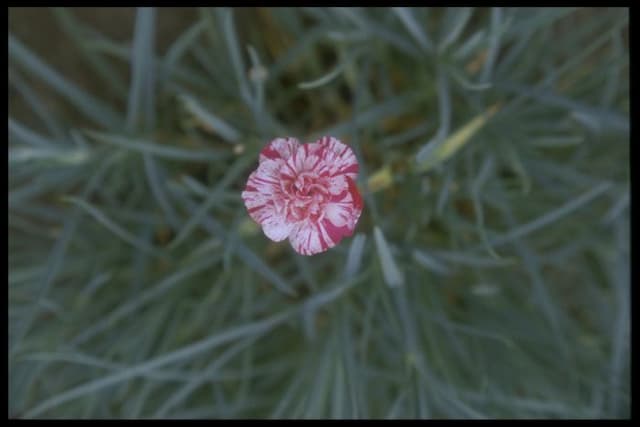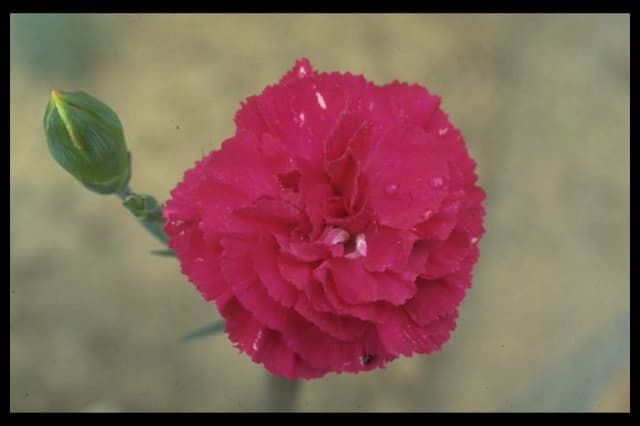Sweet William Dianthus 'Jean Knight' (b)

ABOUT
Dianthus 'Jean Knight', commonly known as pinks due to the frilly edges of the petals that appear as if they were cut with pinking shears, is a herbaceous perennial plant celebrated for its striking flowers and pleasant fragrance. The blossoms are often a vibrant mix of pink and purple hues, with a distinctive pattern of concentric circles or a bi-color design that can include lighter shades or white, adding an eye-catching contrast. Each flower showcases a dense grouping of petals that are lush and velvety to the touch, forming a compact, full head that exudes a sweet and spicy scent. The foliage of the Dianthus 'Jean Knight' is slender and bluish-green, forming a neat, cushion-like mound as an attractive backdrop to the vivid blooms. The leaves are linear and have a grass-like appearance, which provides textural interest throughout the growing season. This elegant contrast between the brightness of the flowers and the soothing green of the leaves makes it a prominent choice for gardeners who wish to add a pop of color and delicate fragrancy to their borders, rock gardens, or container arrangements.
About this plant
 Names
NamesFamily
Caryophyllaceae
Synonyms
Sweet William, Pinks, Carnation
Common names
Dianthus 'Jean Knight'
 Toxicity
ToxicityTo humans
The plant known as Carnation is generally considered non-toxic to humans. There are no well-documented cases of Carnation poisoning leading to severe health issues in humans. However, as with many plants, sensitive individuals may experience mild irritation or an allergic reaction upon ingesting or handling the plant.
To pets
Carnations are known to be mildly toxic to pets, including cats and dogs. If a pet ingests part of a Carnation, they might experience mild gastrointestinal upset, which can include symptoms such as vomiting or diarrhea. It is advisable to keep an eye on your pet and consult with a veterinarian if they consume any part of the plant and exhibit these symptoms.
 Characteristics
CharacteristicsLife cycle
Perennials
Foliage type
Evergreen
Color of leaves
Blue-green
Flower color
Pink
Height
1 foot 2-4 inches (35-40 cm)
Spread
1 foot (30 cm)
Plant type
Herb
Hardiness zones
7
Native area
Europe
Benefits
 General Benefits
General Benefits- Attractive Blooms: Dianthus 'Jean Knight', commonly known as Pink, produces beautiful pink flowers that add color and visual interest to gardens.
- Long Blooming Season: Pinks typically have a lengthy blooming period, providing a long-lasting display of flowers.
- Easy to Grow: This plant is known for being easy to cultivate and care for, making it suitable for gardeners of all skill levels.
- Drought Tolerance: Once established, Pinks have good drought tolerance, requiring less watering and maintenance.
- Deer Resistance: The Dianthus species is often resistant to deer, which helps prevent damage to the plant in areas with deer populations.
- Fragrance: Pinks are often fragrant, adding a pleasant scent to the garden that can be enjoyed by gardeners and visitors alike.
- Edging and Borders: With their compact growth habit, Pinks are excellent for creating defined edges and borders in garden beds and pathways.
- Pollinator Friendly: The flowers attract bees and butterflies, which are beneficial for pollination and the overall health of the garden's ecosystem.
- Versatility: Dianthus 'Jean Knight' can be used in various garden settings, including rock gardens, containers, and as ground cover.
 Medical Properties
Medical PropertiesThis plant is not used for medical purposes.
 Air-purifying Qualities
Air-purifying QualitiesThis plant is not specifically known for air purifying qualities.
 Other Uses
Other Uses- Floral Crafts: The colorful blossoms of the Carnation can be used in dried flower arrangements, wreaths, and potpourri, due to their retained color and shape post-drying.
- Edible Garnishes: Carnation petals are edible and can be used to add a splash of color and a mild spicy flavor to salads or desserts, but always ensure they're free from pesticides.
- Plant Dye: The vibrant petals can be used to make natural dyes for fabrics or art projects, where eco-friendly and non-toxic coloration is desired.
- Bookmark Decoration: Pressed Carnation flowers can serve as delicate and aesthetically pleasing decorations for bookmarks, adding a personal touch to gift or craft projects.
- Culinary Oil Infusion: Petals can be infused into oils to impart a subtle flavor and aroma, which can then be used in aromatic cuisine or as a dressing.
- Special Event Decor: Because Carnations are often associated with love and fascination, they can be used for themed parties or events like a "Victorian Tea Party" or a romantic dinner.
- Photography Prop: Their striking appearance makes Carnations excellent subjects or additions to the composition in botanical photography.
- Greeting Cards: Carnation petals can be used to adorn handmade greeting cards, lending a unique, tactile element to traditional paper crafts.
- Perfumery: Although not a common ingredient, Carnation fragrances can be incorporated into homemade perfumes or scented candles for their spicy floral scent.
- Natural Insect Repellent: While not as effective as commercially available products, Carnations can sometimes be used in natural insect repellent mixtures owing to their unique scent.
Interesting Facts
 Feng Shui
Feng ShuiThe Carnation is not used in Feng Shui practice.
 Zodiac Sign Compitability
Zodiac Sign CompitabilityThe Carnation is not used in astrology practice.
 Plant Symbolism
Plant Symbolism- Love: Dianthus is often associated with love and affection. The 'Jean Knight' cultivar, with its beautiful flowers, reinforces this symbolism and is commonly given to express deep romantic feelings.
- Admiration: The striking appearance of the Dianthus 'Jean Knight' suggests admiration. It's a way to convey respect and high esteem for someone's achievements or qualities.
- Purity: The bright and vibrant colors of Dianthus 'Jean Knight' can symbolize purity and innocence, much like many flowers with vivid hues are often associated with these virtues.
- Boldness: The Dianthus species is known for its spicy fragrance and lasting blooms, symbolizing boldness or courage, and the 'Jean Knight' variant embodies these traits as well.
- Devotion: With its long-lasting flowers, Dianthus 'Jean Knight' can represent faithfulness and a lifelong commitment, making it suitable for conveying feelings of devotion.
 Water
WaterCarnation, commonly known as 'Jean Knight', should be watered thoroughly but infrequently, allowing the soil to dry slightly between waterings. Typically, this means watering once every week or two, but this schedule can vary depending on environmental conditions such as temperature and humidity. Provide approximately one gallon of water per plant each time you water, ensuring it reaches the roots but avoiding waterlogging the soil. During hot, dry spells, water may be needed more frequently, while in cooler, wet periods, less frequent watering is necessary. Always check the soil moisture level a few inches down to determine if additional watering is needed.
 Light
LightCarnations prefer full sun conditions, so place 'Jean Knight' in a spot where it can receive at least six hours of direct sunlight each day. An east- or south-facing location is typically ideal, maximizing exposure to the sun's rays without subjecting the plant to overly harsh afternoon light. However, in extremely hot climates, some light afternoon shade may be beneficial to prevent scorching.
 Temperature
TemperatureCarnations thrive in a temperate range but can survive in temperatures from as low as 20 degrees Fahrenheit to as high as 80 degrees. For optimal growth, the 'Jean Knight' should be kept within a temperature range of 50 to 75 degrees Fahrenheit. They can endure occasional drops below this range, but prolonged exposure to extreme cold or heat can be detrimental to the plant's health.
 Pruning
PruningCarnations like 'Jean Knight' should be pruned to promote bushier growth, remove spent flowers, and maintain a neat appearance. Deadheading, or removing the faded blooms, should be done regularly throughout the blooming season to encourage further flowering. Additionally, cutting back the foliage by one-third in early spring can help rejuvenate and stimulate new growth. Pruning is also an opportunity to remove any dead or diseased stems, which should be done as needed throughout the year.
 Cleaning
CleaningAs needed
 Soil
SoilThe best soil mix for the carnation (Dianthus 'Jean Knight') is well-draining and fertile, with added organic matter like compost or well-rotted manure. A slightly alkaline soil pH between 6.7 and 7.5 is ideal for these flowers.
 Repotting
RepottingCarnations (Dianthus 'Jean Knight') generally don’t need frequent repotting and can be repotted every 2-3 years or when they outgrow their current container.
 Humidity & Misting
Humidity & MistingCarnations (Dianthus 'Jean Knight') prefer moderate humidity levels but are quite adaptable and can tolerate the lower humidity levels typically found in home environments.
 Suitable locations
Suitable locationsIndoor
Place in bright indirect sunlight and ensure good air circulation.
Outdoor
Plant in full sun with well-draining soil and space for airflow.
Hardiness zone
3-9 USDA
 Life cycle
Life cycleDianthus 'Jean Knight', commonly known as Pinks, begins its life as a seed, which when sown in fertile, well-draining soil and given proper warmth, will germinate. Seedlings emerge and establish a root system, followed by the development of foliage—a clump of blue-green, grass-like leaves. As the plant matures, it produces sturdy stems topped with fragrant, frilled flowers in a range of colors, typically blooming in late spring to early summer. After the blooming period, if the flowers are deadheaded, it may encourage a second, albeit smaller, bloom period in the early fall. Pinks are short-lived perennials and may start to decline after several years, at which point they can be propagated by cuttings or division to rejuvenate the plant population. In some climates, they may self-seed, and with proper winter protection, the plant will undergo dormancy before restarting its growth cycle in the spring.
 Propogation
PropogationPropogation time
Spring-Summer
The Dianthus 'Jean Knight', commonly known as Pinks, can be propagated through several methods, but the most popular method is by cuttings. This is usually done in late spring to early summer. To propagate by cuttings, select a healthy, non-flowering stem and cut a piece about 4 to 6 inches long. Remove the lower leaves and dip the cut end into a rooting hormone to encourage root growth. The cutting should then be inserted into a mix of sand and peat or a well-draining potting mix. It is essential to maintain high humidity around the cutting by covering it with a plastic bag or placing it in a propagator. Keep the soil moist but not waterlogged, and in a few weeks, the cuttings should root, after which they can be transplanted to their permanent location.




![Pink [Coconut Sundae]](/_next/image?url=https%3A%2F%2Fplants-admin.emdemapps.com%2Fimages%2Fplants%2F%2Fimages%2F604b5d09d4fd1.png&w=640&q=75)




